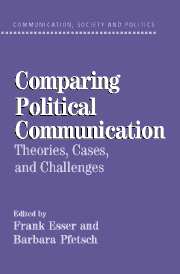Book contents
- Frontmatter
- Contents
- Contributors
- Comparing Political Communication
- INTRODUCTION
- I THEORIES AND METHODS
- 2 Americanization, Globalization, and Secularization: Understanding the Convergence of Media Systems and Political Communication
- 3 Transnational Trends in Political Communication: Conventional Views and New Realities
- 4 Comparing Mass Communication Systems: Media Formats, Media Contents, and Media Processes
- 5 Designs and Methods of Comparative Political Communication Research
- II CASES
- III PERSPECTIVES AND CHALLENGES
- Author Index
- Subject Index
- References
3 - Transnational Trends in Political Communication: Conventional Views and New Realities
Published online by Cambridge University Press: 24 November 2009
- Frontmatter
- Contents
- Contributors
- Comparing Political Communication
- INTRODUCTION
- I THEORIES AND METHODS
- 2 Americanization, Globalization, and Secularization: Understanding the Convergence of Media Systems and Political Communication
- 3 Transnational Trends in Political Communication: Conventional Views and New Realities
- 4 Comparing Mass Communication Systems: Media Formats, Media Contents, and Media Processes
- 5 Designs and Methods of Comparative Political Communication Research
- II CASES
- III PERSPECTIVES AND CHALLENGES
- Author Index
- Subject Index
- References
Summary
Political communication systems are dynamic, constantly evolving, never settled. Just when we think we understand how it all works, things change. Sometimes the changes seem to be evolutionary, steps along a path that leads to a destination we can foresee. At other times, the familiar path turns in new and unexpected directions.
Quite recently, the transnational trends in political communication that have been observed in many countries over the preceding decade have taken some unexpected turns. In some ways, these new turns challenge the conventional wisdom that emerged from many comparative studies. In other ways, the new turns confirm the conventional wisdom. We cannot yet know where the new turns will lead, but we do know that our settled views must be revisited. It is ever thus in the study of political communication. The game is always afoot.
This chapter describes some of the conventional wisdom concerning transnational trends in political communication that has emerged from comparative studies, then identifies recent developments that seem alternately to confirm and challenge the received view. The chapter concludes by considering what we may learn from the new realities and where the new paths may lead.
TRANSNATIONAL TRENDS: THE CONVENTIONAL VIEW
The search for transnational trends in political communication through comparative studies hardly seems old enough to have a history. It was in 1975 that Blumler and Gurevitch (1975, 165) proposed a comparative framework for studies of political communication, noting that “few political communication studies have yet been mounted with a comparative focus” and that “comparative political communication research must be the least advanced topic dealt with in this volume [of approaches to the study of political communication].”
- Type
- Chapter
- Information
- Comparing Political CommunicationTheories, Cases, and Challenges, pp. 45 - 63Publisher: Cambridge University PressPrint publication year: 2004
References
- 15
- Cited by



